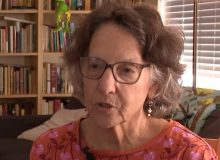By Julianna Bat-Simeon Tisha B’Av Zionism
Sometimes, prayer can seem like a daunting task. For some of us, we feel like, without a rabbi to tell us what page to turn to or where to start in our siddur, we don’t know if we’re “doing it right.” For all of us, the goal is never to go through the motions and simply say the Hebrew words without feeling that spark, that connection to God. Prayer helps us as a Jewish people have a unified connection to the Almighty, which is a pretty big deal.
While at university, a rabbi at my school encouraged me to get in the habit of always saying the Modeh Ani before getting out of bed as a way of saying “thank you” to God every day. This small act of saying such a short but meaningful prayer has added a little burst of spirituality to my day. Even if you’re not used to praying outside of Shabbat or other holidays, developing a new habit of making an effort to say even one prayer a day can strengthen our unity as Jews.
When I think about ways to elevate our every day and sometimes mundane lives (especially during this time of pandemic) by reminding ourselves of our connection to prayer, I am also reminded of the inseparable tie between Jews and Zionism. I am writing this article as we approach Tisha B’Av, where our goal is not merely to mourn and wallow at the tragedies that have befallen our people. Rather, in the words of another rabbi at my university’s Hillel, “When people feel a yearning for God, that is the manifestation of God’s compassion. Compassion is holding someone where they are and helping them to grow.”
As Jews, God wants us to strive to be our best selves, and through it all, we have evidence that God has not abandoned us. How does this relate to Zionism? Well, God made it a point to tell our ancestor Rachel in the biblical book of Jeremiah, “Thus says God, hold back your voice from crying, and your eyes from tears: for there is a reward for what you have done, says God, and they will return from the land of your enemies. There is hope for you in the end, says God, your children will return to their borders.”
Indeed, these prophetic words have come true: After years of exile, today, the Jewish people have reclaimed their homeland and returned to Israel. When we challenge ourselves to be better people and reconnect with God, we also come closer to achieving our goal of living peacefully with each other in the land God has granted us.
On Tisha B’Av, we will mourn a broken connection between the Jewish people and God, but God has always granted us the space to rebuild that connection. As we continue to fight for our homeland against those enemies who work to destroy it, as we make mistakes and struggle to pray sometimes, and as we don’t always view all Jews as our family, God is still there to help us grow.
Zionism is a dream, and taking steps like saying the small Modeh Ani daily prayer or taking time to educate yourself about Israel can help us make meaning by coming closer to God, and through our actions, to each other as well.
Postscript:
The full Modeh Ani text in English is: “I offer thanks to you, living and enduring King, for You have graciously returned my soul within me. Great is Your faithfulness.” To read about Israeli Actress Gal Gadot’s thoughts on the prayer, CLICK HERE
Julianna Bat-Simeon is a member of the Herut North America Youth Cabinet from the Midwest. Herut is an international movement for Jewish Unity, Zionist pride, and education. It is dedicated to the ideals of pre-World War Two Zionist leader Ze’ev Jabotinsky. Jeff Dunetz (The Lid) is an active member of the organization –Please consider joining me in this great organization at this link.
Cross-Posted with Arutz Sheva
Tisha B’Av Zionism






